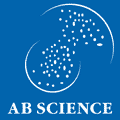If you are interested in participating in the ongoing study, please contact us at clinical@ab-science.com
COVID-19 is a respiratory disease triggered by a novel coronavirus (SARS-CoV-2) which causes substantial morbidity and mortality. Since the outbreak of the SARS-CoV-2 in China in December 2019, the pandemic spread continuously and rapidly over the world. As of today, no treatment has demonstrated a positive effect on hospitalized COVID-19 patients.
Therefore, there is an urgent public health need for rapid development of novel interventions.
Many patients with moderate and severe COVID-19 develop a “cytokine storm” that leads to severe pulmonary inflammation and various thrombotic events associated with acute respiratory distress syndrome (ARDS) and potentially death.
There is evidence that mast cells could contribute to COVID19-induced inflammation by activating the early release of inflammatory compounds and that macrophages could contribute to excessive inflammation and activation-induced lymphocytic cell death during COVID-19 infection1.
Therefore, the “cytokine storm” syndrome and lung injury may be avoided by inhibition mast cells and macrophage activity.
Since masitinib inhibits mast cells activity and macrophages, there is a strong rationale to develop masitinib in the treatment of moderate and severe forms of COVID-19.
An independent study led by the University of Chicago recently reported that in vitro masitinib produces a strong anti-viral effect on the SARS-CoV-2 virus2.
From an initial library of 1,900 compounds, either approved for human use or with extensive safety data in humans, masitinib has been identified as the most potent anti-viral compound, since it totally abrogated SARS-CoV-2 progeny production.
In particular, masitinib stood-out in its ability to completely inhibit activity of the SARS-CoV-2 main protease (3CLpro), thereby blocking viral replication.
In January 2021, an independent study from the Institute of Human Virology (Guangzhou, China) confirmed the masitinib anti-viral activity against the SARS-CoV-2 in vitro3.
AB Science received authorization by French Medicine Agency (ANSM) to initiate a Phase 2 study evaluating masitinib in combination with isoquercetin for the treatment of moderate and severe COVID-19. The study will enroll patients in France and other countries. The primary objective is to improve the clinical status of patients after 15 days of treatment.
References
- Kritas, S. K. et al. Mast cells contribute to coronavirus-induced inflammation: new anti-inflammatory strategy. J. Biol. Regul. Homeost. Agents 34, (2020).
- Drug repurposing screen identifies masitinib as a 3CLpro inhibitor that blocks replication of SARS-CoV-2 in vitro by Drayman N et al. in bioRxiv (2020).
- Luo Y, Yu F, Zhou M, et al. 2021. Engineering a reliable and convenient SARS-CoV-2 replicon system for analysis of viral RNA synthesis and screening of antiviral inhibitors. mBio 12:e02754-20. https://doi.org/10.1128/mBio.02754
